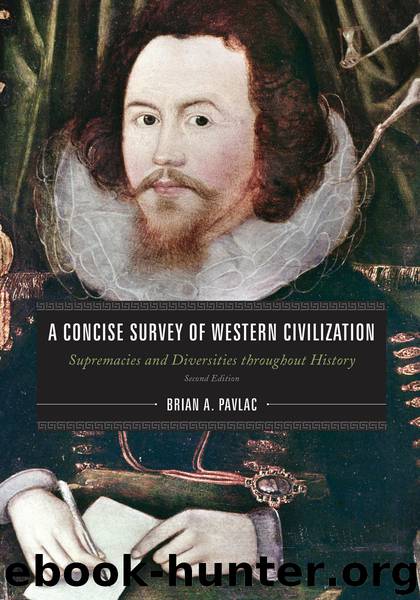A Concise Survey of Western Civilization by Brian A. Pavlac

Author:Brian A. Pavlac
Language: eng
Format: epub
ISBN: 9781442237681
Publisher: Rowman & Littlefield Publishers
Enlightenment philosophes clearly stated the first part of the principle; the historical record proves the second part.
Religious toleration reflected the Enlightenment’s third big concept, humanitarianism, the attitude that humans should treat other humans decently. Ostensibly, the Christian faith and Christ’s command about loving one’s neighbor had a strong humanitarian component. Throughout history, however, Christian society clearly fell short of that ideal, with crusades, inquisitions, witch hunts, slavery, and cooperation with warmongers, for example. Some Christian preachers had even claimed that suffering was a virtue, calling on the faithful to wait until they died before they received any reward of paradise.
Beyond the suffering of hard conditions, active cruelty saturated eighteenth-century Western society. People visited insane asylums to watch inmates as if they were zoo exhibits. Curiously, zoos also started at that time out of scientific interest; they likewise cruelly confined wild animals in unnatural, small, bare cages. Popular sports included animal fights where bulls, dogs, or roosters ripped each other to bloody shreds. The wealthy ignored the sufferings of the poor, worsened through economic upheavals and natural disasters. Public executions frequently offered Sunday pastimes for large crowds, who watched as criminals were beheaded, burned, disemboweled (intestines pulled out and thrown on a fire), drawn and quartered (either pulled apart by horses or the dead body chopped into four pieces after partial strangulation and disembowelment), beaten by the wheel (and then the crippled body tied to a wheel and hung up on a pole), or simply hanged (usually to die by slow strangulation). The corpses dangled for weeks, months, even years, until they rotted to fall in pieces from their gibbets.
With the Enlightenment, the elites began to abolish such inhumanity. This new humanitarianism’s virtue did not require divine commandments as its foundation. Instead, this principle of morality declared that human beings, simply because they were observably human, should be respected. Rulers passed laws to end the practices of torture and to eliminate the death penalty, or at least to impose it only for the most heinous of crimes. Soon, long-term imprisonment became the common, if expensive, method of punishing criminals. Some reformers actually thought that prisons might even rehabilitate convicts away from their criminal behavior.
Even more novel, leaders began to use social reforms to prevent crime in the first place. They reasoned that poverty and ignorance contributed to the motivations of criminals, so by attacking those social ills, crime rates could be expected to decline. The idea of promoting a good life in this world, summed up in Thomas Jefferson’s famous phrase, “life, liberty and the pursuit of happiness,” came, for some, to be considered a basic human right.
Another radical idea of the humanitarians was the abolition of slavery. In the Enlightenment, for the first time in history, most leaders of society actually began to feel guilty about enslaving other human beings. People still debated whether black Africans could be human beings or deserved to be mere property, treated however the masters desired. Slaves were so expendable that as much as a
Download
This site does not store any files on its server. We only index and link to content provided by other sites. Please contact the content providers to delete copyright contents if any and email us, we'll remove relevant links or contents immediately.
The Daily Stoic by Holiday Ryan & Hanselman Stephen(3299)
The Fate of Rome: Climate, Disease, and the End of an Empire (The Princeton History of the Ancient World) by Kyle Harper(3055)
People of the Earth: An Introduction to World Prehistory by Dr. Brian Fagan & Nadia Durrani(2727)
Ancient Worlds by Michael Scott(2682)
Babylon's Ark by Lawrence Anthony(2671)
The Daily Stoic by Ryan Holiday & Stephen Hanselman(2568)
Foreign Devils on the Silk Road: The Search for the Lost Treasures of Central Asia by Peter Hopkirk(2454)
India's Ancient Past by R.S. Sharma(2450)
MOSES THE EGYPTIAN by Jan Assmann(2411)
The Complete Dead Sea Scrolls in English (7th Edition) (Penguin Classics) by Geza Vermes(2270)
The Earth Chronicles Handbook by Zecharia Sitchin(2225)
Lost Technologies of Ancient Egypt by Christopher Dunn(2222)
24 Hours in Ancient Rome by Philip Matyszak(2078)
Alexander the Great by Philip Freeman(2064)
Aztec by Gary Jennings(2021)
The Nine Waves of Creation by Carl Johan Calleman(1912)
Curse Tablets and Binding Spells from the Ancient World by Gager John G.;(1860)
Before Atlantis by Frank Joseph(1849)
Earthmare: The Lost Book of Wars by Cergat(1819)
